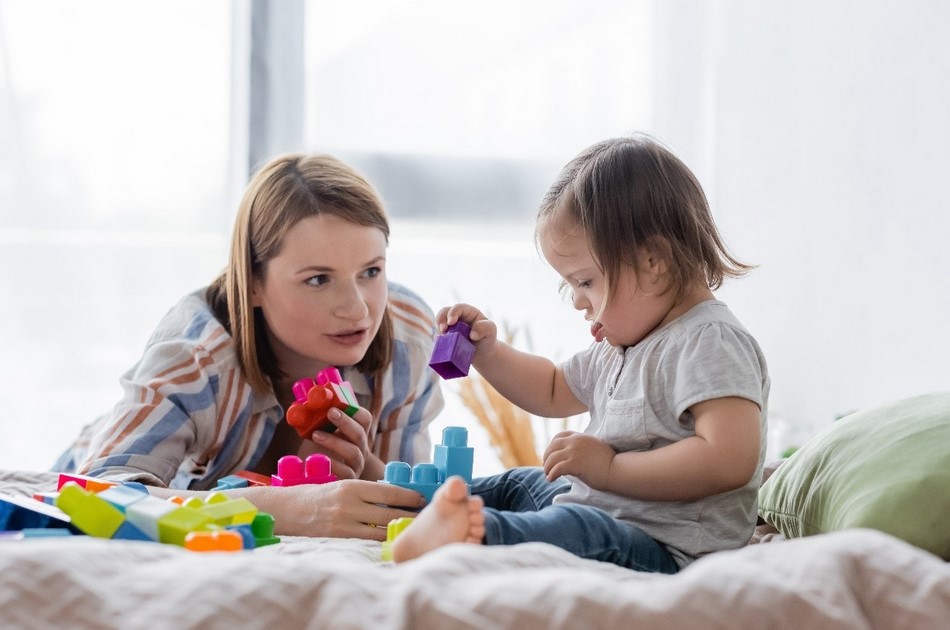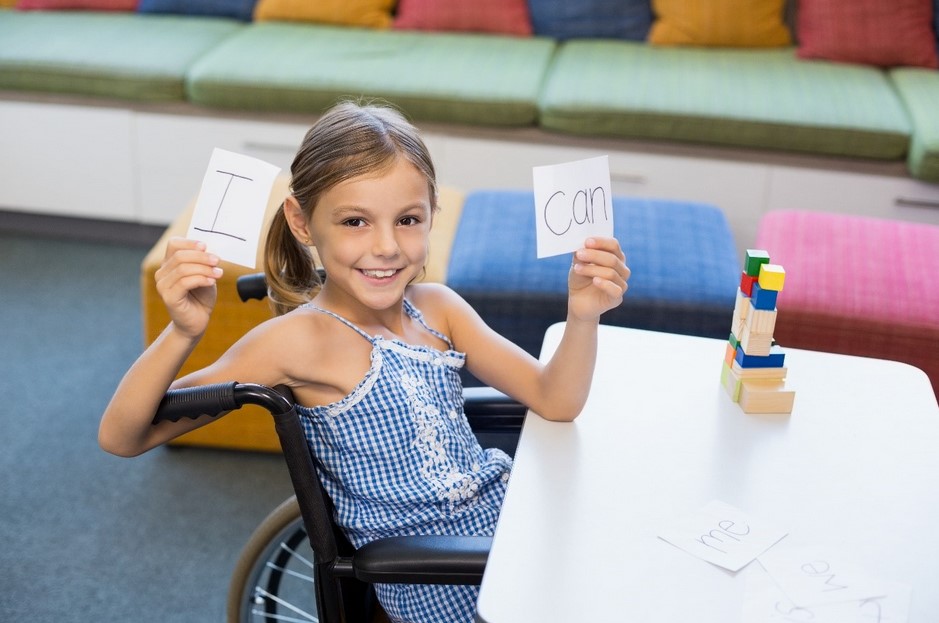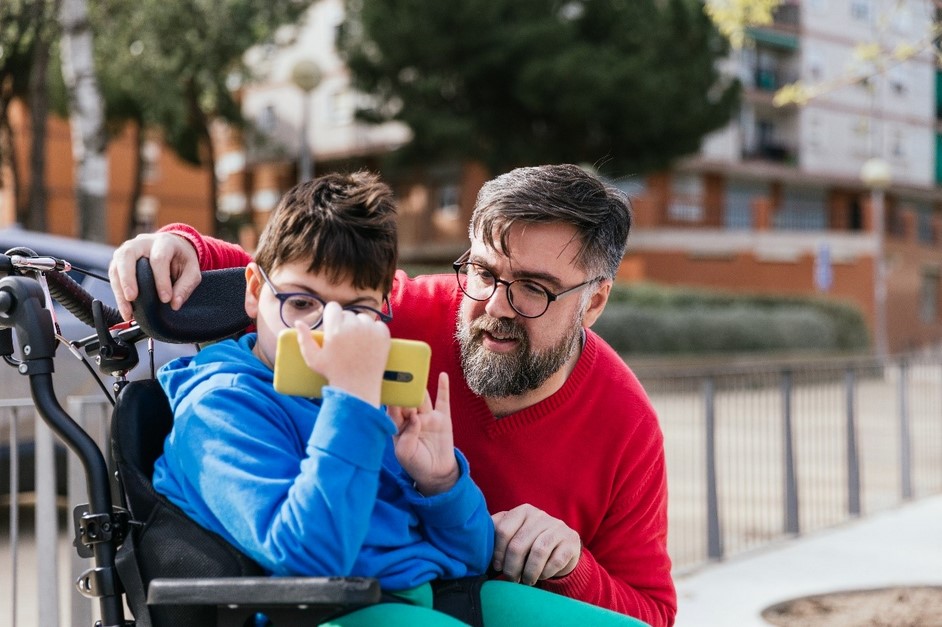The Role of Parents and Caregivers in Early Childhood Intervention
If your child has a disability or developmental delay, getting involved in their early childhood intervention activities is a powerful way to help them thrive and fulfill their potential.
Understanding Your Crucial Role in Early Childhood Early Intervention
- spending quality time with them
- listening to them
- accepting them for who they are
- treating them with care, kindness and respect.
Tips for Nurturing Your Child’s Development at Home
Here are some things you can do at home that will complement any childhood early intervention activities you’re taking part in.
Create a Stimulating Environment
Children grow and develop by exploring the world around them. You can support this by providing:
- sensory stimulation – expose your child to different sounds, textures, foods, and visual experiences to engage their senses.
- opportunities to play – children learn through play, so give them plenty of time each day for enjoying games, puzzles, and toys. You might like to choose playtime activities that align with your child’s goals, such as playing with building blocks to help develop fine motor skills.
Develop Daily Routines
Consistent routines give children a sense of security. Predictable routines can be particularly beneficial for children with certain developmental conditions, such as autism.
Encourage Communication
Communication skills are essential for your child’s success at school and socially. Whatever communication system you are using (speech, sign language etc), aim to interact regularly and often with you child throughout the day.
It’s also helpful to encourage your child to communicate with a wider range of people, including any siblings, extended family members, and people in your community.
Build Healthy Habits
The habits your child develops now can make a difference to their lifelong health and wellbeing. Healthy eating and physical activity are two essential foundations for good health.
Children with a disability or developmental delay sometimes need some support to get the nutrition and activity they need for healthy growth and development. A paediatric dietitian can create a balanced dietary plan suited to your child’s needs. An accredited exercise physiologist can design a physical activity program to help your child reach their goals.
Foster Independence
Building independence is often a goal of NDIS early childhood intervention supports. You can assist with this by:
- gradually introducing tasks that encourage independence – for example, you could encourage your child to do age-appropriate tasks such as dressing themselves, brushing their own teeth, packing their schoolbag or completing simple chores. This helps foster a sense of accomplishment and self-reliance.
- offering choices – giving your child a choice, even in small things such as which colour shirt to wear, empowers them to assert themselves and develop decision-making skills.
- teaching them to advocate for themselves – as your child gets older, they may be able to become their own advocate. Teach your child to express their needs and preferences to help them build self-advocacy skills.
- using adaptive devices – equipment and technology such as wheelchairs, internet-connected devices and accessible content can give your child greater autonomy and independent function.
Celebrate Small Wins
Positive reinforcement helps to embed the skills your child is working on. Be sure to celebrate every achievement, no matter how small it might seem.
Enhancing Motor Skills Through Play and Exploration
Children often enter an early childhood intervention program because they have physical challenges with things like muscle strength, coordination or motor skills.Positive reinforcement can encourage your child with their early intervention activities.
- do appropriate activities that enhance balance and coordination – this could include structured activities like obstacle courses as well as free movements such as kicking or throwing a ball.
- try art and craft activities – things like cutting, colouring, drawing, pasting and sculpting are fun and encourage fine motor skill development.
- play outside – playing and exploring outside not only supports physical development but also offers sensory experiences that can promote overall wellbeing.
Supporting Therapeutic Interventions
Therapeutic supports often form part of an early childhood early intervention program. Parents and caregivers can help their child get the most from these supports by:
- being actively involved in therapy sessions – you can observe what’s going on and, where appropriate, take part in therapy sessions. This will help you learn how to reinforce therapeutic strategies at home.
- completing the home exercise program – the success of any exercise program depends on doing it regularly and consistently. Your therapist will probably give you a home program to complete and your child will need your support to do this.
- staying in touch with therapists – to discuss your child’s progress, challenges, and any adjustments needed in the intervention plan. You know your child better than anyone, and your insights are invaluable in refining the therapeutic approach.
Using Technology to Support Skill Development
Today’s technology can make early childhood intervention activities fun and engaging. Therapy that’s challenging and stimulating is most likely to be effective. You can use technology to:
- support skill development – look for educational apps and games designed to support specific developmental goals. For example, some screen-based games help kids to build fine motor or cognitive skills.
- build community and friendships – you can find support networks, forums and communities of people with similar interests in the online world. This may be especially helpful if you live in an area with limited local opportunities for meeting other kids.
Cultivating Social, Mental and Emotional Wellbeing
Along with promoting healthy physical growth and development, you can help your child build their social, emotional and mental wellbeing by:
- providing opportunities for social interaction – such as playdates, playgroups or participation in sports, clubs or hobbies.
- encouraging them to express their emotions – you can teach your child words for different feelings and create an open, supportive environment for your child to express them.
- cultivating a supportive home environment – simple practices such as open communication, spending time together and expressing love can help create a mentally healthy atmosphere at home.
- seeking professional support if needed – many children with a disability or developmental delay experience challenges with things like emotional regulation, behaviour and mental health. Support from a professional such as a psychologist, counsellor or behaviour therapist can help your child and family find tailored strategies to address these issues.
Technology can make early childhood intervention activities fun and motivating.
Monitoring Your Child’s Progress
It’s important to regularly reassess your child’s developmental progress and goals with professionals. Your team can adjust intervention plans as needed to support continued progress.
You might like to keep a developmental journal to record your child’s progress and any challenges or strategies that prove effective. This record can be a valuable tool for your own reference and for the professionals involved in your child’s care.
Caring for Yourself as a Caregiver
It can be easy to neglect yourself when you’re busy supporting your child. But taking time for some self-care practices can help ensure you have the physical and emotional reserves you need for your caregiving role.
Self-care doesn’t have to be anything fancy. It might be as simple as reading a book, listening to music, making a nice cup of tea or taking a short walk outside.
If the strain of caregiving is taking a toll on your own wellbeing, consider seeking counselling or support services for yourself. Caring for a child with disability or developmental delay can be physically and emotionally demanding, and professional support can be beneficial.
It can also be incredibly helpful to connect with other parents who face similar challenges. You could join a face-to-face or online support group or tap into local community resources. The shared experiences within these networks can provide valuable insights, emotional support, and practical advice.
Early childhood intervention activities in summary
With all the things you can do to support your child, your role in early childhood development intervention might sound complicated. But it doesn’t have to be. The most important things you can do are:- love your child
- communicate and interact with them
- give them plenty of opportunities to play and explore
- build healthy habits as a family
- advocate for their needs
- get involved in therapy as much as you can
- look after yourself.
REFERENCES:
[i] – Jeong J et al. PLoS Med (2021). Parenting interventions to promote early child development in the first three years of life: A global systematic review and meta-analysis. doi: 10.1371/journal.pmed.1003602. [ii] – Frosch CA et al. Am J Lifestyle Med (2021). Parenting and Child Development: A Relational Health Perspective. doi: 10.1177/1559827619849028.Get in touch
hidden
Follow Us


